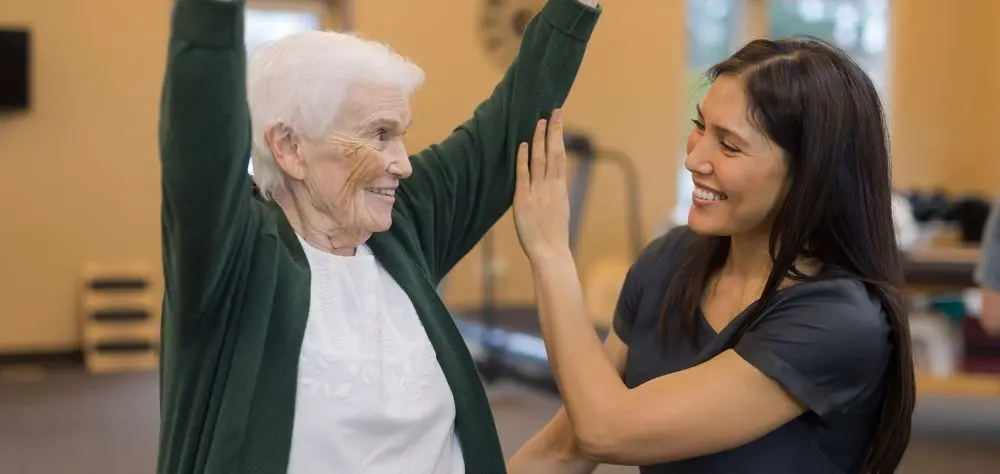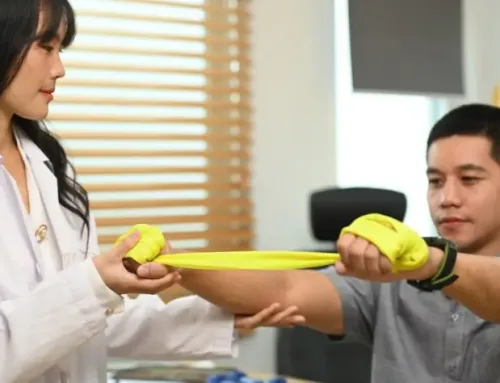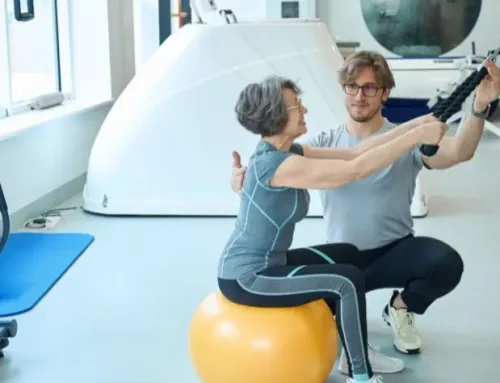Occupational Therapist Skills: From Communication to Critical Thinking
What does it take to be an exceptional occupational therapist? Beyond knowing the science behind rehabilitation, occupational therapist skills include a mix of communication, problem-solving, adaptability, and creativity. Whether guiding a stroke survivor through recovery or helping a child improve motor function, an OT’s ability to assess needs, develop solutions, and motivate patients is just as important as their technical expertise.
These skills don’t just shape day-to-day interactions—they define career success. Let’s explore all the essential skills every OT needs and why they play a crucial role in providing effective, life-changing care.
What It Takes to Be an OT: The Skills That Define the Profession
Being a great occupational therapist goes beyond technical knowledge, requiring a mix of communication, problem-solving, empathy, and creativity. Whether you’re guiding a stroke survivor through daily activities or adapting a classroom for a child with sensory challenges, your ability to connect, think critically, and innovate is what makes the biggest impact.
Skills Every OT Needs to Succeed
These skills define how effectively an OT can motivate patients, collaborate with healthcare teams, and adapt treatment plans to fit unique needs.
Communication: The Heart of Effective Therapy
Occupational therapists work with patients, families, doctors, educators, and caregivers, making strong communication skills essential. They must explain treatment plans clearly, listen actively, and ensure that everyone involved in a patient’s care is on the same page.
- Explaining complex therapy techniques in a way that makes sense to patients and their families.
- Collaborating with doctors, physical therapists, and speech therapists to create well-rounded care plans.
- Educating caregivers and parents on how to support therapy progress at home.
Critical Thinking & Problem-Solving: Crafting Personalized Solutions
Every patient is different, and OTs must think fast and adapt their approach when something isn’t working. Whether adjusting a treatment plan or finding creative ways to make therapy more engaging, strong problem-solving skills are a must.
- Designing adaptive tools for patients struggling with fine motor skills.
- Adjusting interventions when a patient isn’t responding to therapy as expected.
- Navigating insurance challenges to ensure patients receive the care they need.
Beyond the Basics: What Sets Great OTs Apart
Emotional Intelligence & Empathy: Connecting with Patients
Patients often come to therapy feeling frustrated, discouraged, or overwhelmed. OTs must be able to offer emotional support, build trust, and keep patients motivated, even when progress feels slow.
- Encouraging independence for patients adjusting to life after an injury.
- Helping children with disabilities feel included and capable in daily activities.
- Understanding cultural differences to provide care that respects a patient’s background.
Adaptability & Creativity: Thinking Outside the Box
No two therapy sessions are the same. The best OTs adjust strategies on the fly and use creative problem-solving to keep therapy engaging and effective.
- Turning therapy into a game for kids who struggle with traditional exercises.
- Helping older adults modify their homes to maintain independence safely.
- Finding new ways to use technology to enhance independence.
Technical & Hands-On Skills: Applying Evidence-Based Techniques
Occupational therapy is hands-on, requiring expertise in anatomy, rehabilitation techniques, and adaptive equipment.
- Performing manual therapy techniques to improve movement and function.
- Teaching patients how to use adaptive equipment like prosthetics or adaptive tools.
- Assessing workplace ergonomics to prevent injuries and improve productivity.
Leadership & Advocacy: Pushing the Field Forward
Great OTs don’t just treat patients—they also advocate for better access to therapy, push for policy changes, and lead the way in developing new interventions.
- Leading rehab teams in hospitals or outpatient clinics.
- Advocating for funding and accessibility in OT services.
- Educating the community on preventative care and wellness strategies.
Being an OT is about more than just knowing therapy techniques—it’s about understanding people, solving problems, and thinking on your feet. From communication and adaptability to technical skills and leadership, these abilities shape an occupational therapist’s impact. No matter where you work, these skills will help you provide the best possible care while advancing your career in this fast-growing field.
How OTs Can Continue Developing These Skills Throughout Their Careers
The best occupational therapists know that learning never stops. While experience strengthens critical thinking, adaptability, and patient communication, the field of OT is always evolving. Staying competitive and effective means continuously developing new skills, whether through certifications, mentorship, research, or emerging technology.
Expanding Skills Beyond the Classroom
Skill Growth Over Time
Some skills come naturally with experience, like adapting treatment plans, solving complex patient challenges, and collaborating across healthcare teams. Others—like mastering the latest rehabilitation technologies or understanding new evidence-based therapies—require ongoing education and commitment.
- Critical thinking and adaptability strengthen over time as OTs encounter diverse cases.
- Technical skills evolve as new treatment methods, tools, and research emerge.
- Interpersonal and leadership abilities develop through working with patients, caregivers, and teams.
Building Expertise Through Mentorship, Research & Technology
Importance of Mentorship & Networking
Even the most experienced OTs can benefit from learning from others in the field. Seeking mentorship from seasoned therapists or engaging in professional organizations helps OTs refine problem-solving strategies, expand their career outlook, and take on leadership roles.
- Collaborating with experienced OTs to develop specialized skills.
- Joining organizations like AOTA for workshops, networking, and career connections.
- Learning from interdisciplinary teams to enhance clinical decision-making.
Adapting to Emerging Technologies
As healthcare technology evolves, staying ahead of the latest tools and innovations is crucial for OTs. Virtual reality therapy, telehealth platforms, and 3D-printed adaptive devices are becoming more common, enhancing how therapists engage with patients and deliver treatment. Telehealth allows OTs to reach clients in remote areas, while VR-based therapy provides a more interactive rehabilitation experience. Advances in assistive technology, from smart prosthetics to AI-powered communication devices, offer more personalized care and improve patient independence. Keeping up with these advancements ensures that OTs remain competitive in the field while expanding the range of treatments they can offer.
SCU’s Innovative OTD: Flexible Learning for Aspiring Therapists
At Southern California University of Health Sciences (SCU), we believe that becoming an Occupational Therapist should be accessible, flexible, and designed for real-world success. That’s why we’ve created an innovative Doctor of Occupational Therapy (OTD) program that helps students fast-track their careers without unnecessary delays or obstacles.
Why SCU? Because We Do Things Differently.
- No Bachelor’s Degree Required – If you have 90+ qualifying college credits, you can jump right into our OTD program and earn your doctorate in just over two years. That means less time in school and more time making an impact.
- Hybrid Learning That Works for You – Our program is 80% online, so you can study from anywhere while still getting the in-person, hands-on training you need. You’ll come to our Whittier, California campus just three weeks at the end of each term—a total of four on-campus visits throughout the program.
- Accredited and Career-Ready – We’re ACOTE-accredited, which means our program meets the highest standards and prepares you to sit for the National Board for Certification in Occupational Therapy (NBCOT) exam with confidence.
- Financial Aid & Scholarships Available – We know affordability matters, so we offer federal financial aid, institutional scholarships, and a fixed tuition guarantee to make sure you don’t run into unexpected costs.
Who Is This Program For?
Our OTD program is perfect for OTAs looking to advance, career changers, and students eager to fast-track their journey into occupational therapy. Whether you’re already working in healthcare or just starting out, we give you the tools, experience, and flexibility to succeed.
Build the Skills. Earn the Degree. Transform Lives.
Occupational therapist skills are more than just clinical knowledge—they shape how you connect with patients, solve challenges, and make a lasting impact. Strong communication, adaptability, problem-solving, and technical expertise help OTs thrive in diverse settings, from hospitals to schools to emerging fields like telehealth and assistive technology.
At SCU’s California campus, we’re committed to helping future OTs master these essential skills while offering a flexible, hands-on education that prepares you for real-world success. Ready to take the next step? Explore our admission requirements and apply today!
FAQs
What are the most important occupational therapist skills?
Successful OTs need strong communication, critical thinking, adaptability, and problem-solving skills. They also rely on technical expertise in rehabilitation techniques, assistive technology, and patient assessments. Emotional intelligence and creativity also play a huge role in making therapy engaging and effective.
How do occupational therapists develop strong communication skills?
OTs refine communication skills through experience, patient interactions, and working with interdisciplinary teams. Active listening, clear explanations, and adjusting communication styles based on a patient’s needs are key. Many therapists also take continuing education courses to improve client education and counseling techniques.
How do OTs keep up with new rehabilitation techniques and technology?
Continuing education, workshops, and professional conferences help OTs stay current. Many pursue advanced certifications or specialize in areas like hand therapy, neurological rehab, or assistive technology to expand their expertise.
How does SCU’s OTD program help students develop essential occupational therapist skills?
Our program blends online coursework with hands-on training, ensuring students build strong clinical, communication, and leadership skills. With real-world fieldwork and cutting-edge tools like VR therapy and 3D printing, we prepare students for today’s evolving OT landscape.
What hands-on experiences will I get in SCU’s program?
You’ll attend four in-person sessions in Whittier, California for immersive lab training, plus complete supervised fieldwork rotations in hospitals, schools, or outpatient clinics near you. This ensures you graduate with real-world experience.
Related Posts





